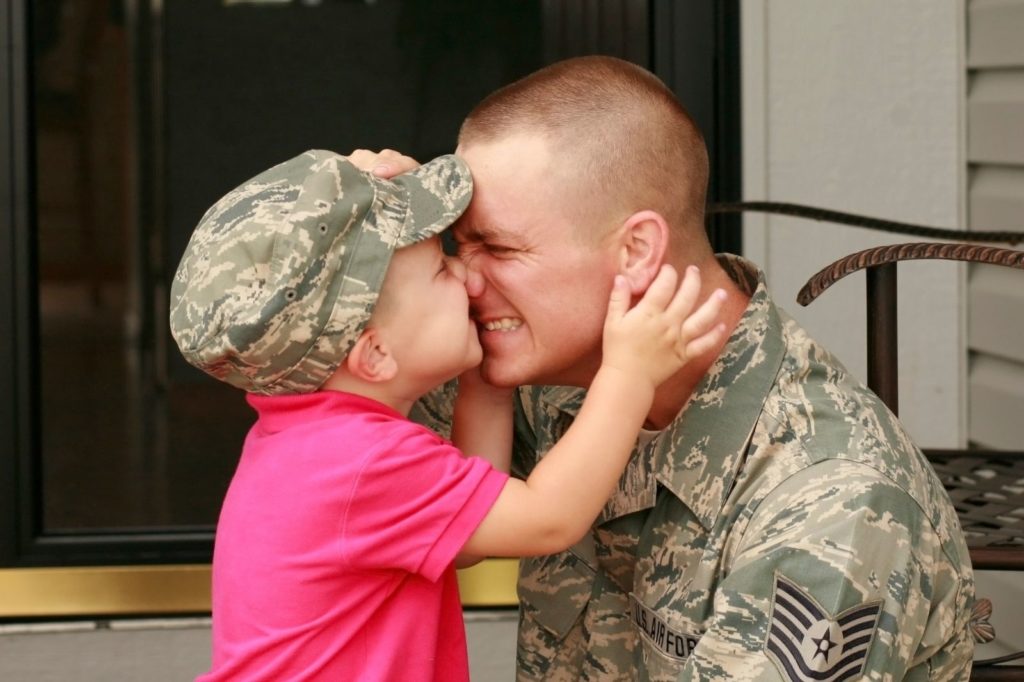For many, being a military service member isn’t just a job. Military service is surrounded by unique culture, values, and lifestyle. Some service members embrace their military culture and training and bring those values home to their families. Others try to intentionally separate themselves from the “soldier” at work and the “parent and spouse” at home.
There is no specific RIGHT way to do things and different strategies work for different families. However, in working with military families, I have noticed that the families who are struggling tend to take an extreme approach at either end of this spectrum.
The “All or None” Approach
Most things in life aren’t black and white. In fact, “all or nothing” thinking is a common unhelpful thinking pattern that can cause problems in our lives. This is true for bringing your military training and values into your home as well. On the one hand, many military values may have great benefit and are meant to create strong and resilient people. Who doesn’t want their family to be strong and resilient?
Completely isolating your family from military life can lead your family to feel left out and they could miss out on the unique strengths that come with being in a military family. On the other hand, the military has a specific purpose and they train people to behave in order to fulfill that purpose. That means that not all aspects of military training and values, rigidly followed, make sense in the context of raising children. Here are key military values that are great to bring in to the family (with moderation) plus a couple of additional values that are essential to good child development.
What to keep, what to toss?
High expectations
The military “breaks you down to build you back up.” They test your limits, push you to the max. They need you to be – not just good – but great. This is because service members often encounter life threatening situations and an unskilled service member could have life or death consequences for themselves or others. It’s the nature of the job.
When it comes to our family, it is important to consider the difference in context between training for a warzone and parenting. Setting high expectations communicates to your children that you believe in them and that they can accomplish great things. However, it is very important that the expectations placed upon them are developmentally and individually appropriate.
Consider each of your children’s age, as well as their unique strengths and struggles while keeping in mind that no one can be great at everything. When you set expectations unrealistically high, you are setting your child up for failure which could have negative consequences on their self-esteem.
Teamwork
The military is composed of many teams. Missions can only be successfully completed through effective teamwork. Teamwork means that each person on a team (or in a family) is important and makes meaningful contributions. When one member of the team is successful, we all celebrate that success. When one member of the team is struggling, we rally around to support them.
Teaching children to work together as a team can set them up for success in school, with peers, and in adulthood. Building teamwork in families works best when parents are able to balance this value with also spending time and showing affection for each of their children individually.
Give it your all
Military training will teach you that when you set out to accomplish a goal, you give it your all – you don’t do things halfway. In a military mission, a service member may go as far as injuring themselves to complete the mission for the sake of the team. This goes back to teamwork – each member of the team is important. On military missions, one person not completing a task can have dire consequences for others.
Similar to high expectations, it is important to keep the context of the environment in mind when teaching perseverance to your children. There is an important difference between completing a task at war and, for example, not dropping an AP class or finishing a soccer game. Teaching integrity can help a child build self-esteem and strength as they accomplish difficult goals and are praised for “putting in their all.” Yet, when it comes to children’s developing minds and bodies, it is important to recognize that it is possible to push a child too hard, leading to injury (for a physical task) and unhelpful, distressing anxiety or self-criticism.
Vigilance
A common military saying: “stay alert, stay alive.” In combat, vigilance is essential. Service members live in extremely dangerous environments in which an enemy is out to harm them.
There are, of course, dangers that children should be aware of. Traffic, bullies, and even child predators. However, when teaching children to be vigilant, it is important to use developmentally appropriate language. Three year olds and thirteen year olds understand the concept of danger very differently and conversations around safety should reflect that.
Also, remember that difference in context. While dangers clearly exist in this world, our children are not fighting an enemy and so the dangers are less probable. When discussing safety with your children, be sure to differentiate between “situational awareness” and hypervigilance or paranoia. While the first can help our children stay safe, the second can lead to phobias, chronic worry, and anxiety.
Self-Control
In the military, self-control and inner strength are essential, and are often represented by training service members to maintain a sense of stoicism.
While strength and self-control are wonderful values to teach our children, the best way to teach children is not the same as how it is trained in service members. To understand this, it is important to consider children’s development and context in which stoicism is used. In war, you are expected to see and experience incredibly difficult and even traumatic events. There may be times that you must push through them or “drink water, drive on” to survive. In contrast, our goal in raising children is to provide a nurturing, safe, and predictable environment. Therefore, the context of the environment is completely different than at war.
In fact, when raising children, it is our job as parents to teach our children to identify and appropriately express our full range of emotions. This means teaching our children to regulate the expression of emotions (which is where self-control comes in), but not to ignore or hide them.
What to add?
Military training and values have potential to provide so much for service members and their families. And yet, because of the context and purpose of the military, they cannot provide all that is needed to raise children. Below are a few things to consider intentionally adding to your parenting toolbox. I want to stress here that the principles below are in no way incongruent with military culture. In fact, I would argue that they fit right in and many service members who are successful and satisfied in their jobs use these tools.
Two-way communication
For important reasons, the military is structured in strict hierarchies. While there are individual differences in leadership styles, much information is communicated in one direction, on a “need to know” basis, and service members can be punished for questioning leadership authority. Hierarchy is important in families as well. Parents are largely the decision makers and children should not be given all of the information all of the time. Yet, as our children develop, so should our communication with them.
Giving children developmentally appropriate information and allowing them opportunities to provide input about family experiences, transitions, and decisions is essential for children to make meaning of and experience some sense of control in the world. In contrast, keeping children in the dark because “they are just children” can be frustrating, confusing, and scary.
Emotional connection
You can think of this as the flip side of stoicism. Our children need to know that we are there for them not only physically, but also emotionally. This means providing an environment that makes it safe to appropriately express any emotions (by appropriately, I mean saying “I’m angry” vs. hitting your sister), and that you appropriately share your emotions with the family as well. This doesn’t mean sharing all emotions you have all the time. However, it does mean sharing enough that your family can understand your actions. This emotional connection is vital for your children to build strong and healthy attachment to you and your spouse.
Finding your Balance
All families are unique. What works for one family may not work for another, and it may take some trial and error to find the right balance of how much to incorporate (or not) military values into your family. If you work to keep in mind the context and intention of these values, as well as how to incorporate them in developmentally appropriate ways for your children, be confident. That balance will come.










